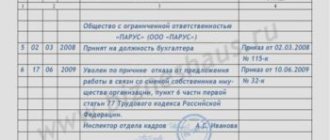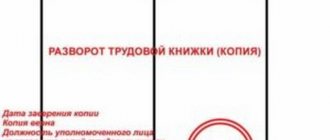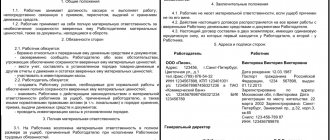In some cases, an employer is forced to part with an employee due to circumstances unrelated to the performance of his or her job duties. In particular, he must carry out the dismissal of the employee following a court decision to deprive him of his freedom for a certain period. Such actions by the employer must be carried out in strict compliance with the law and the entire procedure.
Also see:
- Reinstatement of an employee at work by court decision
- Dismiss without trial
Legislative basis for separation from an employee by court verdict
Often, company employees commit crimes that are subject to criminal prosecution. As a result, the court pronounces an appropriate sentence.
The choice of legislative basis on which to dismiss an employee by court decision depends on whether the defendant is deprived of liberty or given a suspended sentence.
In the first case, he objectively cannot continue to work and the contract with him must be terminated. In the second, the employer formally has no reason to dismiss him only by virtue of a court verdict. But in certain cases, he may use other reasons listed in the Labor Code of the Russian Federation.
In practice, the dismissal of an employee by a court decision due to the impossibility of continuing work carries the least risks for the employer, since it occurs regardless of the will of the parties to the employment contract.
How to enter data into an employee’s personal card
In this case, it is important to correctly indicate the reason for dismissal. Full compliance with the Labor Code of the Russian Federation is necessary. If an employee has lost the right to hold certain positions, a corresponding mark is also placed on his personal card.
The employee must be notified of the information entered and notified of the need to obtain documents. To do this, you can send him a notification. This will free you from responsibility.
Dismissal due to a verdict making it impossible to continue working
To terminate an employment relationship with a convicted employee, three conditions must be met:
- the punishment imposed precludes continuation of work;
- there is a court conviction;
- The verdict came into force.
IMPORTANT!
Courts issue decisions only in administrative cases. In criminal trials, sentences are passed.
The sentence takes effect within 10 days . Provided that no appeal has been filed, from the following point:
- the day of the ruling in court;
- the date of delivery of a copy of the decision to the convicted person - in case of detention.
Depending on the content of the sentence, the date of dismissal of the employee varies. If an employee is arrested or deprived of liberty, then the day of dismissal is the date the decision enters into legal force (Part 1 of Article 389.4 and Part 1 of Article 390 of the Code of Criminal Procedure of the Russian Federation).
If the punishment chosen is deprivation of the right to hold certain positions or perform certain activities, dismissal must be carried out within 3 days after receiving a copy of the verdict and notice from the penal inspection (clause “a”, part 2 of article 34 of the Penal Code of the Russian Federation ).
The initial difficulty lies in obtaining a copy of the verdict. Thus, if an employee is deprived of the right to hold any position, the company will be notified by the penal system. Within 3 days from the moment of receiving the copy, the company removes the convicted person from work and, in the absence of other vacancies in which he can work, dismisses him. This is reported in writing by registered mail with notification to the body of the executive-criminal system.
If the employer is one of the parties to the proceedings and, for example, filed an application for prosecution for theft, in order to dismiss an employee through the court, he only needs to request a copy of the final verdict in court. It must be issued within 5 days from the announcement of the decision (sentence). If the employer was not a party to the process, he needs to request a copy of the document from the convicted employee or his lawyer.
Thus, the dismissal process consists of the following stages:
- Receiving a court verdict.
- Issuance of a dismissal order - in any form or using form No. T-8.
In its field for the grounds for dismissal indicate:
“conviction of an employee to a punishment that precludes the continuation of his previous work, in accordance with a court verdict that has entered into legal force, clause 4, part 1, art. 83 Labor Code of the Russian Federation."
It also indicates the details of the court decision on the basis of which the employee was convicted.
The employee must be familiarized with the order against signature. Most likely, this will be difficult to do. Therefore, the order makes a corresponding note:
SAMPLE ORDER FOR DISMISSAL OF A CONVICTED EMPLOYEE
3. They make an entry in the work book, information about work activities and the employee’s personal card.
The wording of dismissal must be specified in strict accordance with the Labor Code of the Russian Federation. That is, duplicate the grounds for dismissal in the order. In addition, if an employee is deprived of the right to hold any position, a record is also made about this, indicating its name and the period of the ban.
SAMPLE OF COMPLETING AN EMPLOYMENT BOOK WHEN DISMISSAL BY COURT JUDGMENT
Since an employee in such circumstances is unlikely to come to work on his last day of work, it is necessary to send him written notice of the need to appear for all documents. This will relieve the employer from liability for failure to issue a work book.
IMPORTANT!
Documents incl. the work book can be collected by the employee's representative if he has a notarized power of attorney or a power of attorney endorsed by the head of the place of deprivation of liberty.
Payments to the employee must also be made on the day of dismissal. If the employee is in prison, it is advisable to transfer the payments due to him to the deposit of a notary (subclause 1, clause 1, article 327 of the Civil Code of the Russian Federation).
Notification of authorities about dismissal
The employer is obliged to independently notify the state authorities to which his employee is involved that he was dismissed on the basis of an order and a previously issued court decision in a criminal case.
If a citizen during the period of work had restrictions imposed by bailiffs, on the basis of existing arrears in payments or alimony, then after dismissal the company is obliged to notify the FSSP about this action.
Another basis for notification is if a male employee and under 27 years of age was registered with the military registration and enlistment office. After his official dismissal, the personnel department must send a corresponding letter to the military commissariat at the citizen’s place of registration notifying him that he has been dismissed from his position.
Dismissal based on a sentence that does not interfere with the continuation of work
In some cases, an employee may receive a suspended sentence and remain free, but the fact of his offense has been proven in court. For example, he was found guilty of theft or embezzlement, but was not sent to prison.
In addition, there may be cases when, if property is damaged, a protocol on an administrative violation is drawn up (clause 2 of Article 28.2 of the Code of Administrative Offenses of the Russian Federation). In this case, the employee is dismissed for a disciplinary offense on the basis of Art. 81 Labor Code of the Russian Federation.
Then, before dismissal, the general procedure for bringing disciplinary action under Art. 192 and art. 193 Labor Code of the Russian Federation.
The process of termination of employment includes:
- Recording the fact of an offense - by drawing up an act or report.
- Submitting a corresponding application to law enforcement agencies.
- Requesting explanations from the employee (and in case of refusal to give them, drawing up a report within 2 working days);
- Review by the manager of all documents about the offense (by that time there may already be a copy of the court verdict or a protocol on an administrative violation) and a decision to apply dismissal as a disciplinary measure.
- Issuance of an order of dismissal indicating the grounds in strict accordance with the norms of the Labor Code of the Russian Federation. For example, for dismissal for theft, it will be “a one-time gross violation by an employee of labor duties - theft of someone else’s property at the place of work, established by a court verdict that has entered into legal force, sub. “g” clause 6, part 1, art. 81 Labor Code of the Russian Federation." As a basis for an order, you can refer to a court verdict, acts, or the results of an internal audit.
- They make entries in the work book, the register of data on labor activity, and the employee’s personal card.
- On the last working day, all work-related documents and full payment of the due salary are issued, incl. compensation for unused vacation.
IMPORTANT!
If there is a court decision admitting the employee’s guilt, dismissal can be made no later than one month from the date of its issuance.
An option is possible when the employee did not steal anything from the employer, but was convicted under an article that gives the right to dismiss him due to loss of trust. We will talk about such dismissal in a separate article.
Grounds for dismissal through court
It is the Criminal Code that contains a list of norms relating to the commission of illegal acts. Grounds for dismissal through the court will be valid if the employee has committed acts falling under the following articles of the Criminal Code:
- 47 – prohibition on carrying out certain types of activities by court
53 – restriction of freedom of movement- 54 – arrest of an employee suspected of an offense
- 56 – imprisonment for a period established by the court
- 57 – imprisonment for 20 years, the term is equivalent to life
- 160 – theft of other people’s property or embezzlement of funds
As for Article 53 of the Criminal Code, there is an amendment in force. Restriction of freedom of movement means that a citizen will be able to safely move only within the territory of the subject. If he needs to constantly travel on business trips for work, then, according to the court decision, he will be fired, since he will not be able to perform his main job function.
What are the risks for an employer when dismissing a convicted person?
As stated above, the process of terminating an employment contract with a convicted person has certain features that need to be taken into account. In case of violation of the dismissal procedure, the employer may face:
- in case of failure to comply with a court decision - criminal liability under Art. 315 of the Criminal Code of the Russian Federation;
- administrative fines - under Art. 5.27 Code of Administrative Offenses of the Russian Federation;
- recognition of the dismissal as illegal - with the subsequent return of the employee to his previous workplace and payment of earnings lost during the period of forced downtime (paragraph 1 and article 234, part 1 and article 394 of the Labor Code of the Russian Federation).
If you are fired for absenteeism
If an employee is absent from the workplace without a valid reason for more than 4 hours in a row, this is considered absenteeism and may serve as a reason for dismissal. The fact of absence must be documented.
However, punishment cannot be applied to a person until he provides an explanation in writing.
who are absent from the workplace for the following reasons are not subject to dismissal
- An employee’s illness, if it was confirmed by a certificate or certificate of incapacity for work.
- Planned leave, if there is an employee application and a corresponding order from the organization.
- Donating blood.
- Fulfilling their civic duties - appearing in court, serving in the army.
- Participation in an officially authorized rally.
- Wages delayed for more than 2 weeks.
- Inability to fulfill one’s professional duties if the organization’s management is to blame. Such violations of labor protection rules must be recorded by a special commission.
If a person was unfairly fired under the circumstances described, he can sue the employer.
Let's sum it up
It is necessary to dismiss an employee after a court verdict is passed if the verdict makes it impossible to continue working (for example, serving a sentence in a correctional institution).
You can dismiss an employee after a court verdict :
- after a disciplinary sanction with punishment in the form of dismissal;
- by loss of trust;
- if it is impossible to continue working in the previous position and transfer to another with the same employer (for example, if the sentence deprived the employee of the right to engage in certain activities).
In all cases, the legal dismissal procedure must be strictly followed.
The dismissal procedure after a court verdict often has nuances regarding the transfer of necessary documents to the employee and the payment of money due.
Read also
14.06.2018
“Clean” work record
It is likely that the employee does not want to present the new employer with a work book with a record discrediting him, even if it is declared invalid. In this case, he has the right to demand the production of a duplicate in which the invalid entry will be absent. It is with this book that he will get a new job. In this case, the first copy remains “as a keepsake” for the employee.
The costs of making a duplicate are borne by the employer who fired the employee on illegal grounds.










